Videos
Get news, updates and special invites from Transition Salt Spring. Join our mailing list.
Video Archive
Carbon Stewardship Workshop Video #4: The hidden carbon & diversity of old growth forests: Lessons from fungi
| Ecological Research Network, Forests, Resources, Videos
On March 17th 2021, Transition Salt Spring and Raincoast Conservation Foundation hosted the Green and Blue Carbon Stewardship Workshop. This is the fourth of the series of videos from that workshop.
Featuring Marty Kranabetter, the West Coast regional soil scientist with the BC Ministry of Forests in Victoria, who works in soil ecology (especially ectomycorrhizal fungi), biodiversity conservation, carbon sequestration, and forest nutrition/productivity. This presentation by provincial soil scientist, Marty Kranabetter explores the symbiotic relationship between fungi and trees. Four lessons on old growth forest management are presented to improve understanding of how economic needs can be addressed while also maintaining biodiversity values and maximizing carbon sequestration potential.
Investigate. Inform. Inspire. Raincoast is a team of conservationists and scientists empowered by our research to protect the lands, waters and wildlife of coastal British Columbia. learn more at www.raincoast.org
Carbon Stewardship Workshop Video #3: Carbon projects in Canada – An overview
| Ecological Research Network, Forests, Resources, Videos
On March 17th 2021, Transition Salt Spring and Raincoast Conservation Foundation hosted the Green and Blue Carbon Stewardship Workshop. This is the third of the series of videos from that workshop.
A panel discussion highlighting the challenges and benefits of implementing carbon projects in Canada. Featuring moderator, Joseph Pallant (EcoTrust, BC) and panelists, Daimen Hardie (Community Forests International, NB), Garry Wouters (Coastal First Nations, BC), Satnam Manhas (EcoTrust, BC), and Robert Seaton (Brinkman Earth Systems, BC)
Daimen Hardie, Garry Wouters, and Satnam Manhas speak to their experiences designing and implementing forest-based carbon projects, while Robert Seaton speaks to experiences working on “blue” or “wet” carbon projects (still new in Canada, but operating successfully in tropical areas, particularly those that support mangrove forests). The discussion is moderated by Joseph Pallant, Founder of Blockchain for Climate Foundation and Director of Climate Innovation at EcoTrust Canada.
Investigate. Inform. Inspire. Raincoast is a team of conservationists and scientists empowered by our research to protect the lands, waters and wildlife of coastal British Columbia. learn more at www.raincoast.org
Carbon Stewardship Workshop Video #2: Carbon 202
| Ecological Research Network, Forests, Resources, Videos
Featuring Robert Seaton with workshop opening blessing by W̱IĆKINEM (Erik Pelkey), Hereditary Chief of Tsawout
On March 17th 2021, Transition Salt Spring and Raincoast Conservation Foundation hosted the Green and Blue Carbon Stewardship Workshop. This is the second of the series of videos from that workshop.
An intermediate learning session for those with a basic understanding of how nature-based climate projects work. Robert Seaton, a 40 year forest project vetran, simplifies complex concepts by providing tangible, real-world examples and analogies. A step-by-step explanation of the implementation process (i.e. transforming a carbon project (i.e. activities) into a carbon credit (i.e. profit)) is also provided.
Investigate. Inform. Inspire. Raincoast is a team of conservationists and scientists empowered by our research to protect the lands, waters and wildlife of coastal British Columbia.
Carbon Stewardship Workshop Video #1: Carbon 101
| Ecological Research Network, Forests, Resources, Videos
Featuring Dirk Brinkman & Briony Penn with workshop opening blessing by W̱IĆKINEM (Erik Pelkey), Hereditary Chief of Tsawout.
On March 17th 2021, Transition Salt Spring and Raincoast Conservation Foundation hosted the Green and Blue Carbon Stewardship Workshop. This is the first of the series of videos from that workshop.
Otherwise known as “carbon projects for beginners” this webinar unpacks the complexities of implementing blue/green carbon projects in a simplified way. Drawing from a combined 30+ years of experience developing BC-based climate projects, Dirk Brinkman and Briony Penn highlight the importance of establishing co-managed projects and provide definitions of key terms like leakage and additionality. Featuring hand-drawn art and other explanatory diagrams to aid in the learning experience, this session is the ideal starting point for those seeking to improve their understanding of nature-based carbon projects.
Investigate. Inform. Inspire. Raincoast is a team of conservationists and scientists empowered by our research to protect the lands, waters and wildlife of coastal British Columbia. learn more at www.raincoast.org
Using Nature’s Ways to Fight the Climate Crisis
| Ecological Research Network, Past Events, Resources, Videos, Webinar Video, What can I do?
Video Presentation Recording:
On Sunday, April 11th 2021, TSS hosted a presentation by one of Canada’s key biodiversity specialists, Dr. Risa Smith, who helped to clarify the possibilities for local and national science-based initiatives to address climate change. Nature-based solutions are now widely accepted around the world as essential tools for addressing both the Climate and Biodiversity crises.
Dr. Smith discussed nature-based solutions in policy and practice. She explained what to do and what to avoid when it comes to ‘working with nature’ to address climate change and she providde insights for determining when policies are appropriate or just plain ‘green-washing’.
Dr. Risa Smith is currently Chair of the World Commission on Protected Areas, Climate Change Specialist Group.
Over the past 25 years she has been instrumental in developing Canada’s positions at the United Nations Convention on Biological Diversity. Risa lives on Galiano Island and is a founding member and current Director of both the Galiano Conservancy Association and the Salish Sea Renewable Energy Coop.
David Denning, our host, is a Salt Spring-based science educator, naturalist, and climate activist. As an active member of the Salt Spring Community Energy Society, the TSS Education Committee and the Salt Spring Island Conservancy, he applies much of his energy toward community education about climate change, renewable energy, natural history, marine life, and citizen science to understand and protect natural environments.
Bicycle grain mill conversion video
| Food and Agriculture, Resources, Videos
Our family here at appleturnover farm on Salt Spring Island has made a new short film in our ongoing series. This one is about converting a hand-crank grain mill to bicycle-power for greater food security at home and in the community.
“Milling grain at home for resilience, by hand-crank and pedal-power in the appleturnover farmhouse”
https://youtu.be/U7t8cxdPcpE
Elisa Rathje, www.appleturnover.tv, salt spring island, bc
Carbon Stewards – Resources and Links
| Ecological Research Network, Forests, Resources, Videos
Here is a list of resources and links from our panelists and participants from the Green and Blue Carbon Stewardship Workshop on March 17th 2021. More to come- please check back!
Coastal Douglas Fir forest stewardship guidelines to reduce risk:
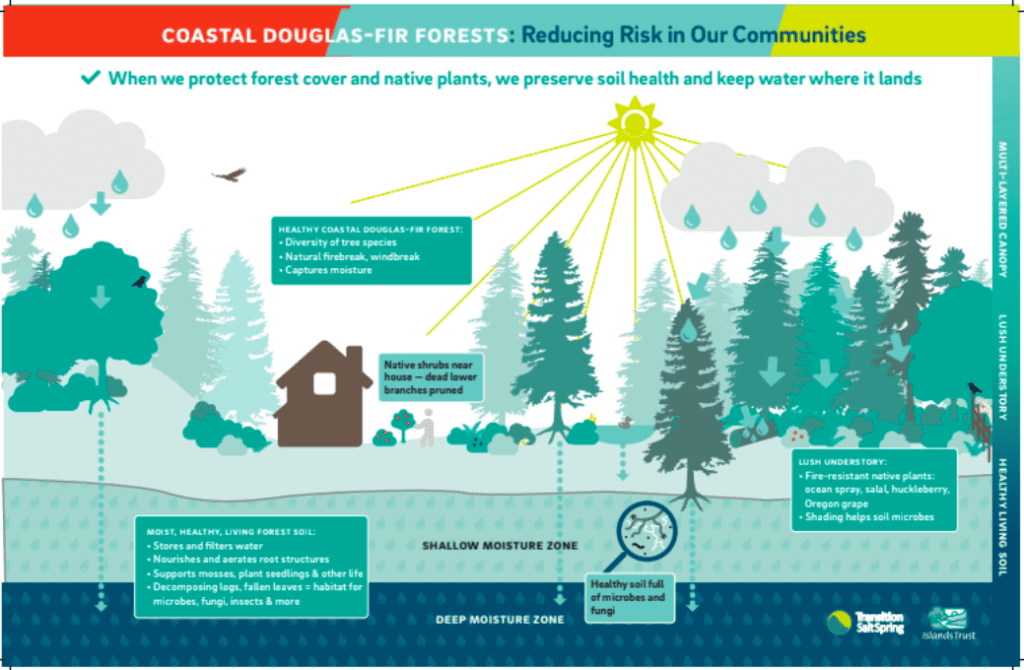
Versus:
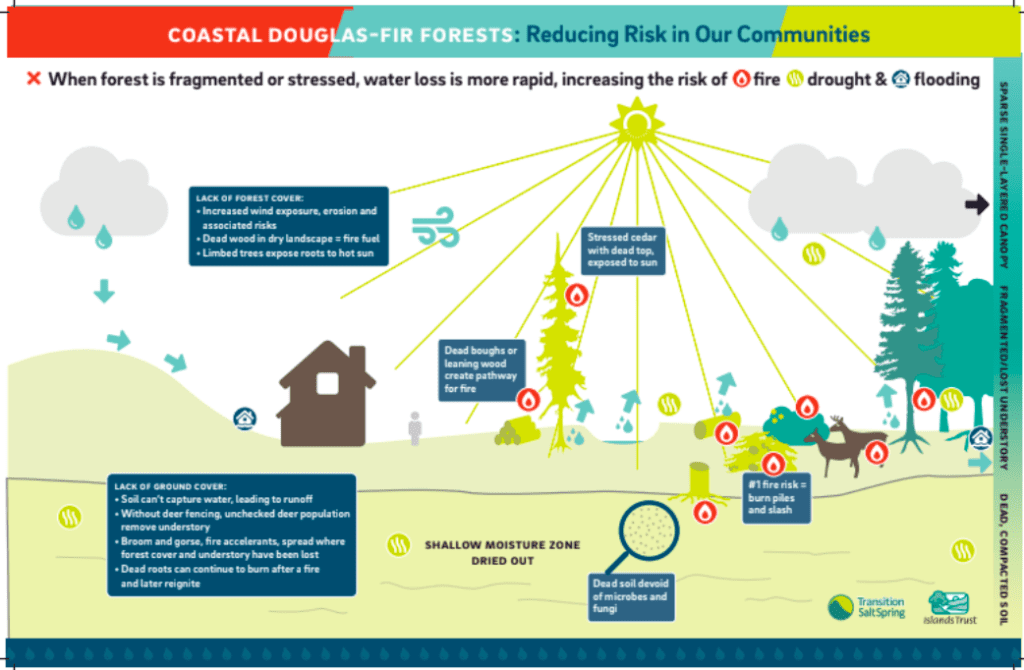
From the Climate Action Plan: CAP-2.0-HERES-WHAT-YOU-CAN-DO-PRINTABLE (Good quality printout available at link)
____________________________________________________________________________
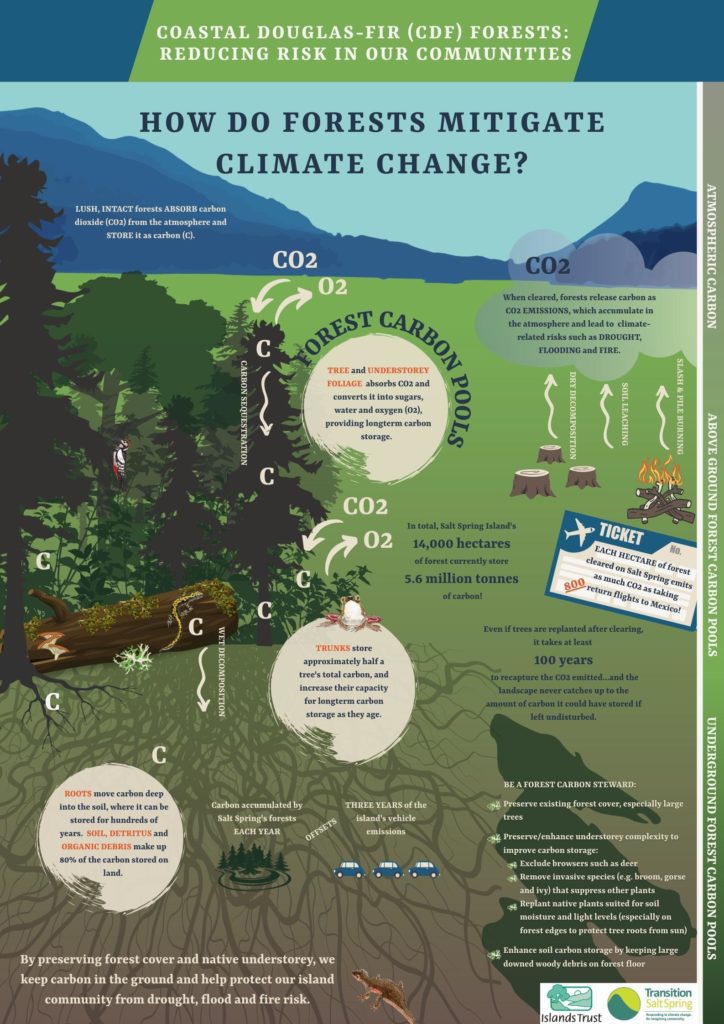
CDF_Infographic_Series_Carbon_2021_03_15_FINAL (Good quality printout available at link)
____________________________________________________________________________
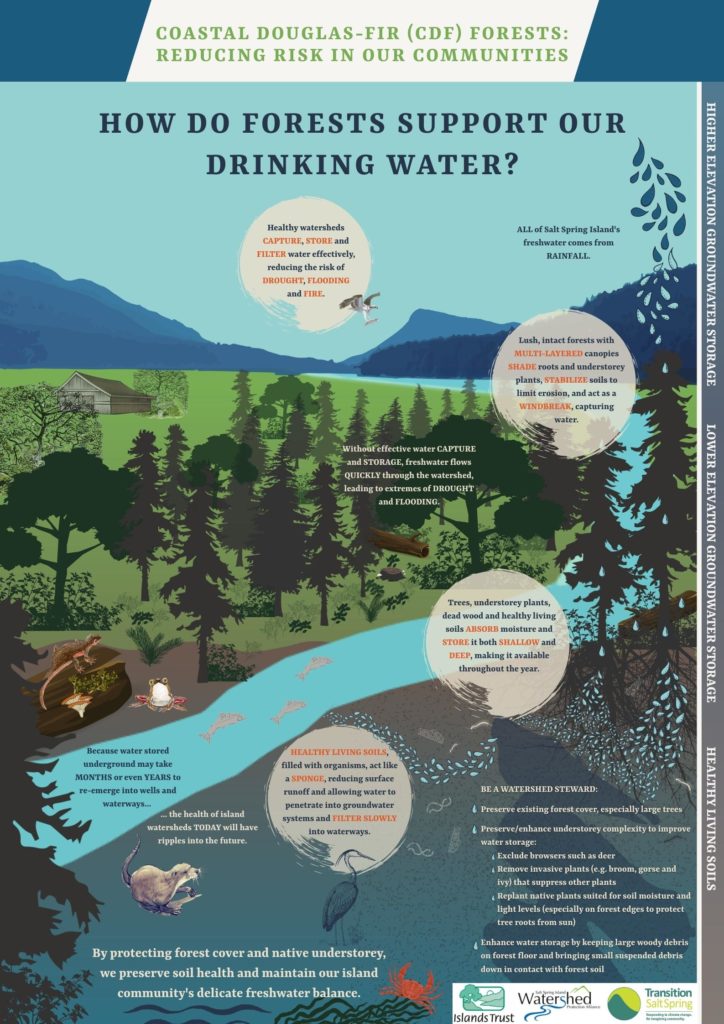
CDF_Infographic_Series_Water_FINAL (Good quality printout available at link)
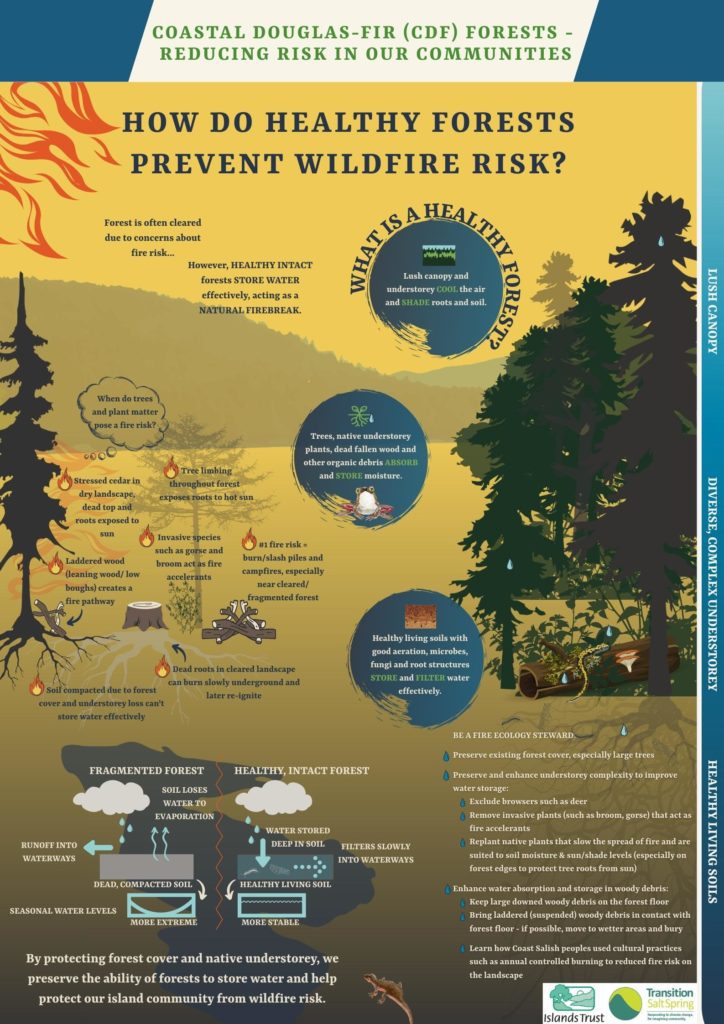
CDF_Infographic_Series_FIRE_FINAL (Good quality printout available at link)
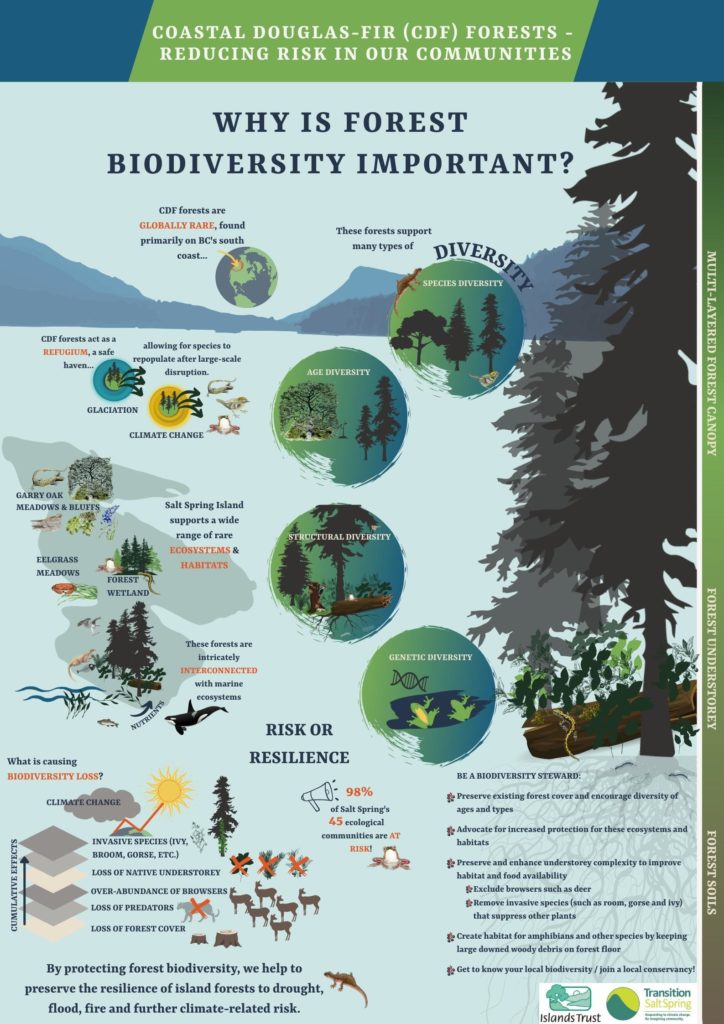
CDF_Infographic_Series_BIODIVERSITY_FINAL (Good quality printout available at link)
____________________________________________________________________________
Other Links and Resources:
NIC researching kelp habitat banks for the forestry sector
Green and Blue Carbon Stewardship Workshop (March 17 2021) Chat Notes
Islanders were invited to the Salt Spring Climate Action Plan Live Zoom Public Presentation & Launch
| News, One Cool Island, Videos
Transition Salt Spring hosted the release of Salt Spring Island’s very own Climate Action Plan with Bryan Young, Transition Salt Spring Society (TSS) Chair, Gary Holman, CRD Director, and Elizabeth May, Member of Parliament, Saanich-Gulf Islands on Tuesday, March 2, 2021 6:30 PM PST on zoom
We all want solutions — and Salt Spring Islanders are ahead of the curve in developing innovative and inspiring responses that build the resilient community we’ll need as the impacts from climate change accelerate.
Hear about how our island is planting the seeds of sustainability, and how you can get involved in a cutting-edge climate action movement rooted right here on Salt Spring. Find out about the key risks our island faces from forest fires, deeper droughts, increasing storms, and rising sea levels. And dig into a rich conversation about what we can do about them: together.
Elizabeth May joined Bryan Young in a conversation about climate action. They unpacked some of the key calls to action in the Climate Action Plan: more than 250 recommendations on what we all need to do now to ensure a sustainable future for Salt Spring Island.
Together we can cut emissions in half by 2030. Together we can do what’s needed to protect our homes, our neighbourhoods, and our ecosystems as climate change accelerates.
The Salt Spring Climate Action Plan (CAP 2.0) has identified several key climate risks we are now facing. The conclusion: risks related to forest fire, storms, drought & sea level rise require immediate action to keep us safe. And to keep us safe we need to protect our forest and freshwater ecosystems. After more than a year and a half of work on the part of a team of 30+ local volunteers and feedback from 2,000 islanders and 50 stakeholders, Transition Salt Spring is proud to announce the release of the Salt Spring Island Climate Action Plan—a roadmap with more than 250 recommendations on what we all can do now to ensure a sustainable future for Salt Spring Island.
To implement the Climate Action Plan, Transition Salt Spring is working with others to develop a strong and active network of islanders, businesses, non-profits, agencies and government to develop the projects and initiatives we will need to keep our communities and ecosystems safe in the coming decades.
Transition Salt Spring is inviting Salt Spring Islanders to join us as a part of the “ONE COOL ISLAND” campaign where we can work together on solutions to help us do all that we can as individuals and families to take action on climate change.
Visit https://transitionsaltspring.com/responding-to-climate-change/ to download The Salt Spring Climate Action Plan 2.0
One Cool Island indeed! Join us at www.transitionsaltspring.com
3 Part Webinar Series on Climate Action for the Gulf Islands.
| Resources, Videos
Islands Trust Climate Action Speaker Series recorded webinars.
Through the webinar series participants will learn how they can support climate change adaptation and resilience at home and in their communities.
Rainwater Harvesting – Presented by Shannon Cowan, Coordinator, Salt Spring Island Watershed Protection Alliance, and William Shulba, Senior Freshwater Specialist, Islands Trust
Ecosystem Based Adaptation – Presented by Ruth Waldick, Ecosystem-based Adaptation Specialist, Ecological Research Network and Tine Rossing, Ecosystem-based Adaptation Specialist, Ecolibrio Consulting
Eelgrass: A Climate Hero – Presented by Aimee McGowan, Blue Carbon Researcher, SFU, Resource and Environmental Management, Victoria Postlethwaite, Blue Carbon Researcher, SFU, Resource and Environmental Management, and Nikki Wright, Eelgrass Conservationists, SeaChange Marine Conservation Society
Here is the link to all three: Stewardship Education Program (islandstrust.bc.ca)
Glossary
Important climate related definitions from Federal Adaptation Policy Framework for climate change – Canada.ca
Adaptation: Adjustment in natural or human systems in response to actual or expected climatic stimuli or their effects that moderates harm or exploits beneficial opportunities.
Climate: The average weather, usually expressed in terms of the parameters temperature, precipitation, and wind.
Climate change: A change in the mean and/or the variability of climate parameters over a period of time ranging from months to thousands or millions of years.
Greenhouse gases: Gases, both natural and anthropogenic, that absorb infrared radiation in the atmosphere, causing warming of the earth. Water vapour, carbon dioxide, nitrous oxide, methane, and ozone are the primary greenhouse gases.
Mitigation: Intervention to reduce the sources or enhance the sinks of greenhouse gases.
Resilience: Capacity of people and systems to absorb negative impacts and respond to changing climate conditions.
Risk: A combination of the likelihood (probability of occurrence) and the consequences of an event.
Risk management: A systematic approach to setting the course of action under conditions of uncertainty, by applying management policies, procedures, and practices to the analysis, evaluation, control, and communication about risk issues.
Sink: Any process, activity or mechanism that removes a greenhouse gas, an aerosol, or a precursor of a greenhouse gas or aerosol from the atmosphere.
Salt Spring Climate Action Plan- Summary Presentation
| News, One Cool Island, Videos
Join Transition Salt Spring Board Chair Bryan Young as he shares a bold, collaborative vision for a resilient future.
Taking action on climate change is about so much more than just burning less fossil fuels, it’s about a vision for how we live together as a community and how we can create a more awesome, humane, technologically and culturally rich and socially inspiring future for us all. It was so exciting to see the overwhelming response to our community engagement; to hear about people’s concerns, people’s successes (as well as their failures) and most of all people’s ideas. We heard that, as a community, we need to:
~ Stand with the most vulnerable among us as well as in the best interest of our common goals.
~ Come up with creative solutions that take into account people and not just policies.
~ Bring in new voices from often-unheard segments of the community.
~ Treat the people that are in fear for their jobs generously and with thanks, rather than demonizing those jobs and not providing a safety net as those jobs are retired out.
~Find a way to move forward on climate in a manner that also addresses our other pressing community concerns such as affordable housing, mental health, jobs and inequality.
The Climate Action Plan is a direct result of that engagement and compiles the best of the ideas put forth by islanders with cutting-edge scientific research, mapping, and participatory action within island institutions.
Watch, share, and join us to chart a new way forward for our island.
Check out resources related to Salt Spring Island Climate Action elsewhere on the Transition Salt Spring website:
https://transitionsaltspring.com/climate-action-group/
Ocean Defenders Virtual Festival
| Marine Stewardship, Resources, Videos
June 8th we celebrate World Oceans Day! You are invited to our virtual festival and gallery ~~~ https://oceandefenders.ca/virtual-festival/
We recognize that this project, though virtual this year, speaks to connections with places that lie in the unceded traditional territories of many Coast Salish nations and beyond. This includes the W̱SÁNEĆ and Hul’q’umi’num (Quw’utsun) around Salt Spring Island, where the project is based. These nations have and continue to have a deep, strong connection to the waters we are honouring through this project. This connection is told through place names, stories, cultural practices and more. Above and beyond a simple acknowledgement, we would like to foster a commitment to putting this recognition into meaningful action by aligning our stewardship actions with movements for indigenous cultural revitalization, land rights and title, and stewardship models. This includes a commitment to learning and openness to feedback on this process. If you’d like to make a personal commitment to this work, here is a great local project to learn about and support:
The Xwaaqw’um Project supports continued Hul’q’umi’num use of the land and sea at Xwaaqw’um (Burgoyne Bay) on Salt Spring Island BC, including upholding responsibilities and connections to the land, the ancestors, to each other and to all animal and plant relations. The core goal is to have everything we do feed back into providing outdoor opportunities for youth to re-engage with culture, language and ways of life that have been forcibly removed from Indigenous communities. Facebook: https://www.facebook.com/xwaaqwum/ Website: https://www.xwaaqwum.com
Eco Home Tour: What’s it all about?
| Built Infrastructure, Eco Home Directory, Videos
Passionate owner-builders. Innovative designs. Lush, locavore landscapes. See all this and more at Transition Salt Spring’s biannual eco-living and home tour. This short film is a snapshot into this great event, happening next in July 2019. Join Transition Salt Spring to get first notice of tickets on sale!
